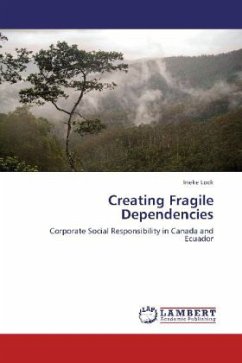
Creating Fragile Dependencies
Corporate Social Responsibility in Canada and Ecuador
Versandkostenfrei!
Versandfertig in 6-10 Tagen
52,99 €
inkl. MwSt.

PAYBACK Punkte
26 °P sammeln!
Claims made about the potential business contribution to social and economic development in developing regions are largely unsubstantiated and little is known about the impact of corporate social responsibility practices on the people it is supposed to benefit. This study analyzes CSR grounded in political economy, situated in the context of globalization, and identifies CSR as a constitutive element of global governance. Additionally, a qualitative case study examines the contextual practice and impact of CSR activities by EnCana Corporation, a Canadian oil and gas company, on Indigenous peop...
Claims made about the potential business contribution to social and economic development in developing regions are largely unsubstantiated and little is known about the impact of corporate social responsibility practices on the people it is supposed to benefit. This study analyzes CSR grounded in political economy, situated in the context of globalization, and identifies CSR as a constitutive element of global governance. Additionally, a qualitative case study examines the contextual practice and impact of CSR activities by EnCana Corporation, a Canadian oil and gas company, on Indigenous peoples and settler communities in Ecuador, and on the Dene Tha First Nation in Canada. The study suggests that CSR practice creates fragile dependencies, subjecting social, ecological and social justice objectives to economic imperatives. Two important processes contribute to the creation of fragile dependencies. First, at the business-society interface, citizens are conceptualized as stakeholders; second, participation in decision-making becomes institutionalized as a limited form of consultation, often delegated to project proponents, without sufficient involvement of the state.












